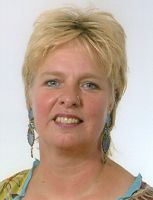Karin Willemse, born in Heemskerk, the Netherlands, in 1962. Ph.D. from Leiden University. Assistant Professor in Anthropology at the Erasmus University Rotterdam.
Fellow (1 September 2005 – 30 June 2006)
ISLAMISM, GENDER AND ETHNICITY IN DARFUR: A STUDY INTO THE CONSTRUCTION OF A SUDANESE NATIONAL IDENTITY
In the year I stayed at the NIAS, I had two goals: to attend international conferences in order to get feed-back on my work. Secondly, to finish a monograph entitled ‘One foot in heaven’. Narratives on gender and Islam in Darfur, West-Sudan, and complete a number of articles related to the anthropological research I conducted for this book in Darfur in the 1990’s and early 2000. The first goal, to present papers at diverse audiences was facilitated by my stay at NIAS as I was able to attend conferences when otherwise I would have teaching responsibilities. As Sudan is an area hardly researched by Dutch academics, I considered it highly important to present my work on Darfur to scholars on Sudan at international conferences and their insights and critical reflections helped me to refine and up-date my arguments. Moreover, I was able to present my work in diverse disciplinary settings outside the field of anthropology (such as history, literary studies, development studies, gender and cultural studies, theology, Islamic studies) I gained alternative insights into the main themes of ‘gender, agency and Islam’, ‘ethnicity, religion and citizenship in postcolonial nation-states’ and refine my ‘methodology of research against the grain’ – it also helped me to introducing my work to other scholars and institutions.
My second goal was related to the first one: after finishing the monograph on Darfur, I wrote several articles based on the presented papers for an edited Special Issue, I wrote a review, and composed a theme-group proposal. The infra-structural support at NIAS (in particular the library service, the editing service and the support service) was important in achieving this, while the general courteous atmosphere and sense of belonging to a special group of academics stimulated my process of thinking and writing. The solitude of the place and surroundings, the lack of responsibilities other than thinking and writing, in combination with the companionship and sometimes heated debates, especially during lunches and other get-togethers, was very stimulating to the process of research I conducted at NIAS.
